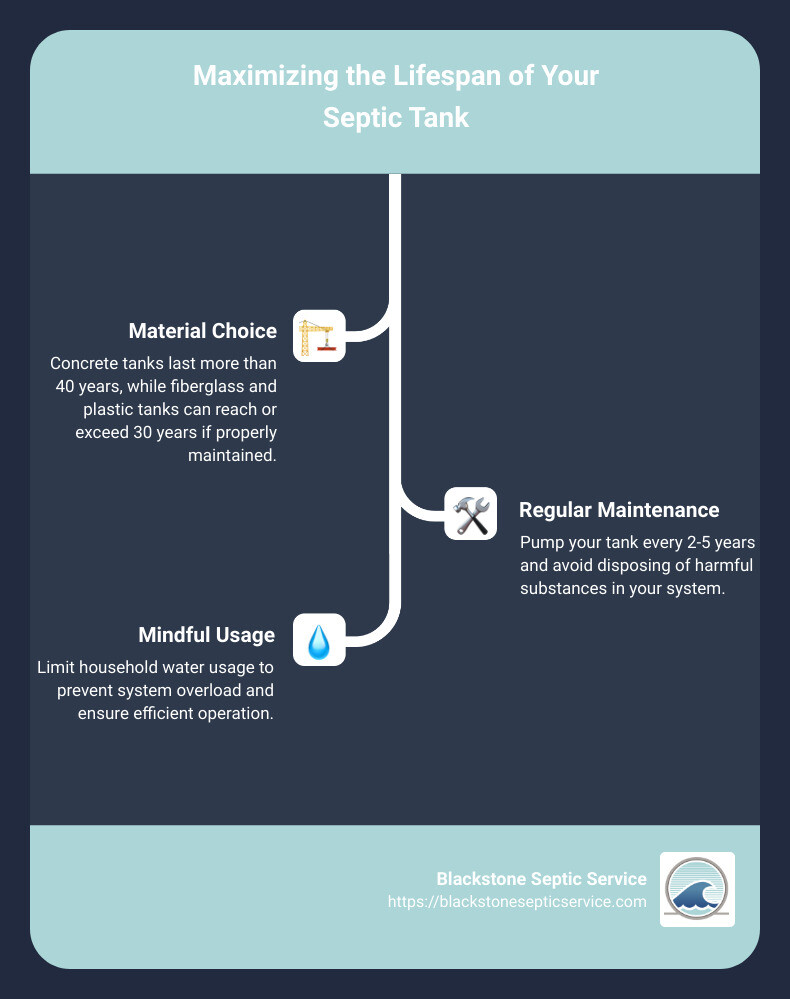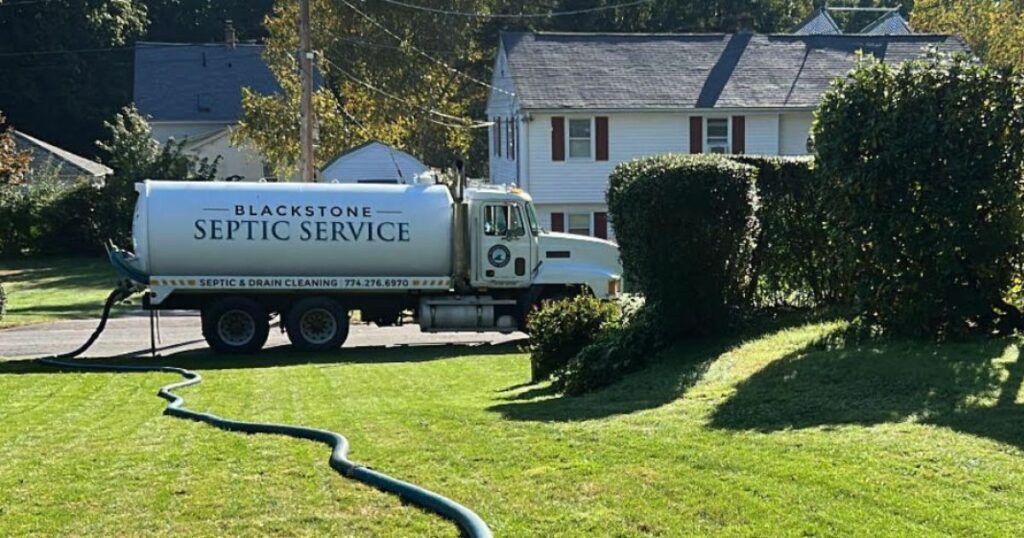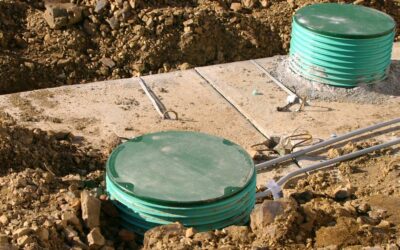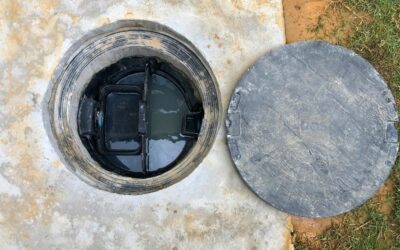Taking care of your septic system is essential for maintaining your home. Even though it’s hidden underground, it plays a vital role in managing your water table and household’s wastewater.
Regular maintenance isn’t just about avoiding problems; it’s about keeping your system running smoothly and lasting longer. Think of it like going to the doctor for your home. Neglecting it could lead to messy and costly issues in the future.
Each situation is unique. If you’re noticing any of these issues, it’s time to call in the professionals. Blackstone Septic Service is here to help, offering inspections to determine the exact problem and solutions to get your system back in top shape.
Don’t wait until it’s too late; a proactive approach can save you time, money, and a lot of headaches.
Here’s a quick rundown on the lifespan of different types of septic tanks:
- Concrete tanks are sturdy and can last over 40 years if properly maintained.
- Fiberglass and plastic tanks also have long lifespans, lasting 30 years or more with the right care.
- Steel tanks, though less common due to corrosion, typically last around 15 to 20 years.
By taking care of your septic system, you’re ensuring the health and longevity of your home’s wastewater management.
How often does a septic tank need to be replaced?
The short answer is, that it varies. A well-maintained system can last 20 to 30 years, but these signs might indicate it’s time for a replacement sooner than you thought. Ignoring these warning signs can lead to more significant, more expensive problems down the road. Key factors influencing this include:
- Material: Concrete, fiberglass, or plastic
- Usage: Level of household activity
- Maintenance: Regular pumping and care

In summary, your septic system’s lifespan is largely in your hands. With thoughtful usage and regular maintenance, it’s possible to push the boundaries of your system’s longevity, ensuring it serves your home efficiently for many years to come.
Table of Contents
Understanding Septic Systems
When we talk about septic systems, we’re diving into a world that combines engineering, biology, and environmental science. It sounds complex, but let’s break it down into simpler parts: Materials, Design, and Function.
Materials
Septic tanks can be made from various materials, each with its own set of pros and cons:
- Concrete: The heavyweight in terms of durability and lifespan. A well-maintained concrete septic tank can last more than 40 years. However, they’re not immune to issues like cracking or settling.
- Steel: These tanks are less common today due to their tendency to rust and corrode, offering a shorter lifespan of 15-20 years.
- Fiberglass and Plastic: Lighter and resistant to rust and corrosion, these tanks can last 30 years or more with proper care. They’re also easier to install but can be more expensive upfront.
Design
The design of a septic system is more than just a tank; it’s a carefully planned setup that includes the tank itself and the drain field. The system is designed to separate solid waste from the wastewater, treat it, and then slowly release the treated water back into the environment through the drain field. This process is both natural and efficient, relying on bacteria to break down waste.
Function
The function of a septic system is straightforward yet fascinating. Here’s a quick rundown:
- Waste Separation: All household wastewater enters the septic tank, where solids settle at the bottom, and lighter materials like fats and oils rise to the top.
- Treatment: The middle layer of liquid (effluent) exits the tank and moves to the drain field, where it is further treated by the soil. Microorganisms in the soil help to break down the effluent before it rejoins the groundwater.
- Absorption: The treated water is absorbed by the ground, and the cycle continues.
Understanding these three key aspects of septic systems helps homeowners appreciate the importance of proper maintenance and care. It’s not just about keeping the system running; it’s about protecting our environment and ensuring the safety of our water sources.
The design and function of septic systems highlight the critical role they play in waste management, especially in areas not served by municipal sewage systems. By choosing the right materials and adhering to best practices in maintenance, homeowners can ensure their septic system functions effectively for many years.
As we move into the next section on the Lifespan of Septic Systems, keep in mind the importance of material choice and regular maintenance in extending the life of your septic system. A well-designed and properly functioning septic system is a key component of a healthy home and environment.
In the next section, we’ll explore how different materials and maintenance practices can impact the lifespan of your septic system, and how often a septic tank needs to be replaced to ensure your home remains a safe and pleasant place to live.
Lifespan of Septic Systems

When it comes to septic systems, not all are created equal. The lifespan of your septic tank can vary widely depending on the material it’s made from. Let’s dive into the three most common materials: concrete, plastic, and fiberglass tanks, and see how they stack up.
Concrete Tanks
Concrete septic tanks are the heavyweights of the septic world. They are known for their durability and longevity. A well-maintained concrete septic tank can last more than 40 years. However, they’re not without their issues. Over time, acidic soil conditions can cause corrosion, and if not properly maintained, cracks and leaks may develop. Despite these potential issues, their long lifespan often makes them a worthwhile investment.
Plastic Tanks
Plastic septic tanks are the new kids on the block. They are lightweight, resistant to corrosion, and generally easier to install than their concrete counterparts. With proper care, a plastic septic tank can last 30 years or more. They’re not prone to cracking like concrete, but they must be installed correctly to avoid shifting or damage from external pressure.
Fiberglass Tanks
Fiberglass septic tanks offer a middle ground between a concrete tank and a plastic one. They are more resistant to corrosive substances and soil conditions than concrete tanks and are less likely to crack. A fiberglass tank can also last 30 years or more with proper maintenance. They are lightweight and easy to install, though, like plastic tanks, they require careful installation to prevent damage.
How Often Does a Septic Tank Need to Be Replaced?
The question of how often does a septic tank need to be replaced largely depends on the material of the tank and how well it’s maintained. Concrete tanks can last over 40 years, while plastic and fiberglass tanks can serve well for 30 years or more. Regular inspections and maintenance are key to extending the life of any septic system, regardless of the material.
It’s also important to watch for signs that your septic system may need to be replaced sooner than expected. These include slow drains, unusually green grass around the drain field, foul odors, signs of water contamination, plumbing backups, and standing water. If you notice any of these signs in a new septic tank it’s time to call a professional.
At Blackstone Septic Service, we understand the importance of a well-maintained septic system for the health and safety of your home. Whether you’re dealing with a concrete, plastic, or fiberglass tank, regular maintenance and care are essential for prolonging its lifespan.
In the next section, we’ll discuss the signs that indicate your septic system may need replacement and how to maintain your new septic system to extend its life as much as possible.
Signs Your Septic System Needs Replacement
When your septic system starts showing certain signs, it’s like a car’s check engine light turning on. It means, “Hey, take a closer look at me; something might be wrong.” Here are some clear signals that your septic system might need a replacement. Don’t worry; we’ll keep it simple and straightforward.
Slow Drains
- What it looks like: Your sinks, toilets, and showers are taking their sweet time to drain. If it’s happening all around the house, it’s not just a simple clog.
- Why it matters: Slow drains can signal that your septic tank is full or that there’s a blockage somewhere in your system.
Greener Grass
- What it looks like: A patch of your lawn is suddenly looking like a golf course, especially lush and green over the drain field.
- Why it matters: It’s not because you’ve become a pro at lawn care overnight. This can mean sewage is leaking and fertilizing that area of the lawn.
Foul Odor
- What it looks like: A smell that reminds you of rotten eggs or just plain sewage around your property.
- Why it matters: This unpleasant guest indicates that your septic tank is overflowing or there’s a break in the system letting odors escape.
Water Contamination
- What it looks like: Your well water test comes back with bad news, showing signs of bacteria or nitrates.
- Why it matters: It’s a serious health risk and a sign that your septic system could be leaking into your water supply.
Plumbing Backup
- What it looks like: Sewage backing up into your home, gurgling sounds from the plumbing, or both.
- Why it matters: It’s not just gross; it means your septic system is clogged or overfull and can’t handle waste from your home anymore.
Standing Water
- What it looks like: Puddles in your yard, not after a rainstorm, especially around the drain field.
- Why it matters: This could mean the septic system isn’t properly processing and disposing of the wastewater.
In the next section, we’ll dive into how regular maintenance and care can extend the life of your septic system and keep it running smoothly. Stay tuned for practical tips and insights from Blackstone Septic Service.
Maintenance and Care for Longer Lifespan
When it comes to septic systems, a little TLC goes a long way. Here’s how you can keep your system running smoothly for years to come.
Pumping Frequency
How often does a septic tank need to be pumped? This is a common question with a not-so-simple answer. Generally, you should pump your septic tank every 3 to 5 years. But, this can vary based on the size of your septic tank replacement part, the number of people in your household, and how much water you use.
Pumping is crucial to remove the build-up of solids in your tank. If left unchecked, these solids can clog your system, leading to costly repairs.
Avoiding Clogs
To keep your septic system healthy, watch what you flush. Only human waste and toilet paper should go down your toilets. Here’s a quick list of don’ts:
- No grease or oils
- No non-biodegradable items like wipes or feminine hygiene products
- No chemicals that could disrupt the bacteria in your tank
These items can lead to clogs and other issues that could shorten the lifespan of your septic system.
Professional Inspections
An ounce of prevention is worth a pound of cure. Regular inspections by professionals like Blackstone Septic Service can catch potential problems before they become big ones. During an inspection, experts will check the tank, pipes, and drain field for any signs of trouble.
It’s recommended to have your septic system inspected every 1 to 3 years, depending on your system’s size and usage.
Blackstone Septic Service
Choosing the right service provider is key. Blackstone Septic Service offers comprehensive care for your septic system, from routine pumping to emergency repairs. With their expertise, you can rest easy knowing your septic system is in good hands.
In conclusion, regular maintenance, including pumping, avoiding clogs, and professional inspections, is essential for the longevity of your septic system. Blackstone Septic Service is here to help every step of the way, ensuring your system runs smoothly for years to come.
Conclusion
In wrapping up, the journey of maintaining a healthy septic system is a marathon, not a sprint. Routine maintenance is the cornerstone of ensuring your septic system serves you effectively over the years. It’s not just about prolonging the lifespan of your system but also about safeguarding your home and the environment. Regular pumping, avoiding harmful substances down the drain, and ensuring your system is inspected by professionals can make a world of difference.
Speaking of professionals, professional assistance is not just an option; it’s a necessity when it comes to septic systems. Whether it’s routine checks or addressing potential issues, having a team of experts you can trust is invaluable. They bring not just their expertise but also peace of mind, knowing that your system is in good hands.
This is where trust in Blackstone Septic Service comes into play. With decades of experience and a commitment to excellence, we are your go-to experts for all things septic. From routine maintenance to emergency repairs, our team is equipped to handle your needs with the utmost care and professionalism. We understand the intricacies of septic systems and are dedicated to providing solutions that are not just effective but also sustainable.
Contact us today at Blackstone Septic Service, we believe in building lasting relationships with our clients, grounded in trust and satisfaction. We’re not just service providers; we’re partners in ensuring the health and longevity of your septic system. So, whether you need routine maintenance or facing septic challenges, we’re here to help.
For more information on how we can assist you, visit our Septic Services page. Let’s work together to keep your septic system running smoothly for years to come.
Frequently Asked Questions about Septic Tanks
When it comes to septic systems, we know you’ve got questions. Let’s dive into some of the most common inquiries homeowners have.
Can a septic tank last 100 years?
Short answer: It’s highly unlikely. While we all wish our septic systems could last a century, the reality is a bit different. The lifespan of a septic tank depends on the material it’s made of, how well it’s maintained, and several environmental factors. Concrete tanks, for instance, can last more than 40 years if properly cared for. However, reaching 100 years is a stretch due to natural wear and tear and changing environmental conditions.
What is the life expectancy of a septic system?
The life expectancy varies based on the tank’s material, usage, and maintenance. On average:
- Concrete septic tanks can last 40 years or more.
- Fiberglass and plastic tanks can last 30 years or beyond with proper care.
- Steel tanks are less durable, typically lasting 15 to 20 years before rust and corrosion set in.
These are averages. Your septic system’s lifespan can be longer or shorter based on how well you maintain it.
How do I know if my septic tank is bad?
There are several tell-tale signs that your septic system might be failing:
- Slow drainage in sinks, showers, and toilets.
- Greener grass over the drain field, indicating possible leakage.
- Foul odors coming from the yard or drains.
- Water contamination near the septic system.
- Plumbing backups inside your home.
- Standing water or soggy soil in the drain field area.
If you notice any of these signs, it’s crucial to contact a professional like Blackstone Septic Service immediately. Early detection can save you from costly repairs or full system replacement.
Maintaining your septic system doesn’t have to be complicated. With regular care and professional help from Blackstone Septic Service, you can ensure your septic system works and functions effectively for as long as possible. If you have noticed any issues or suspect your septic system may be failing, don’t hesitate to reach out. The key to a long-lasting septic system is proactive maintenance and immediate action when problems arise.
Our Content
Our experienced septic tank specialists have carefully reviewed and edited all of the content to ensure that it meets our high standards for quality and accuracy. At Blackstone Septic Service, our mission is to provide unparalleled expertise and service excellence in the realm of septic system care. With a dedicated team of professionals committed to delivering top-tier septic solutions, we specialize in comprehensive services such as routine maintenance of clogged drains, septic tank pumping, and even new septic system installations. Blackstone Septic Service is a family-owned company with highly trained technicians, with over 75 years of experience in septic tanks.



